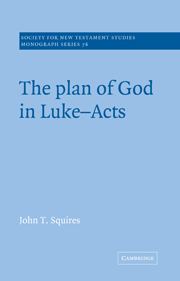Book contents
- Frontmatter
- Contents
- Acknowledgements
- List of abbreviations
- 1 The plan of God in Luke–Acts
- 2 The Programmatic role of providence in hellenistic historiography
- 3 Providence: God at work in human history
- 4 Portents: signs of divine action in human history
- 5 Epiphanies: inspired indications of the plan of God
- 6 Prophecy: foretelling and fulfilling the plan of God
- 7 Fate: the necessity of the plan of God
- 8 Conclusions
- A select bibliography
- Index of Greek words
- Index of subjects and authors
- Index of biblical references
7 - Fate: the necessity of the plan of God
Published online by Cambridge University Press: 22 September 2009
- Frontmatter
- Contents
- Acknowledgements
- List of abbreviations
- 1 The plan of God in Luke–Acts
- 2 The Programmatic role of providence in hellenistic historiography
- 3 Providence: God at work in human history
- 4 Portents: signs of divine action in human history
- 5 Epiphanies: inspired indications of the plan of God
- 6 Prophecy: foretelling and fulfilling the plan of God
- 7 Fate: the necessity of the plan of God
- 8 Conclusions
- A select bibliography
- Index of Greek words
- Index of subjects and authors
- Index of biblical references
Summary
Luke highlights the inner necessity inherent in the plan of God as it works itself out in the life of Jesus and the growth of the early church. This necessity, expressed in a variety of verbs, governs the life of Jesus as well as the apostolic mission. Certain sayings of the apostles also indicate the inevitability of the course of events. However, alongside this insistent emphasis on the necessity of the plan of God, there are frequent moments emphasizing both the possibility of opposing God's purposes and the dimensions of human co-operation with the plan of God. Amongst others, both Jesus and Paul play significant roles in the plan of God, not merely as human pawns of an arbitrary divine necessity, but as key figures in implementing that plan. The explicitly philosophical issue of the relation of such human free-will to divine necessity thus requires investigation with regard to Luke's overall conception of the plan of God.
Fate and free-will in hellenistic historiography
Complementary notions of a predominating, deterministic Fate (μοι̂ρα) and of a fickle, cantankerous Fortune (τύχη) are found throughout the popular Greek literature of antiquity. Alongside the role which Dionysius and Diodorus accord to Fortune, each acknowledges a view of Fate somewhat akin to the Stoic conception of universal Fate.
- Type
- Chapter
- Information
- The Plan of God in Luke-Acts , pp. 155 - 185Publisher: Cambridge University PressPrint publication year: 1993



